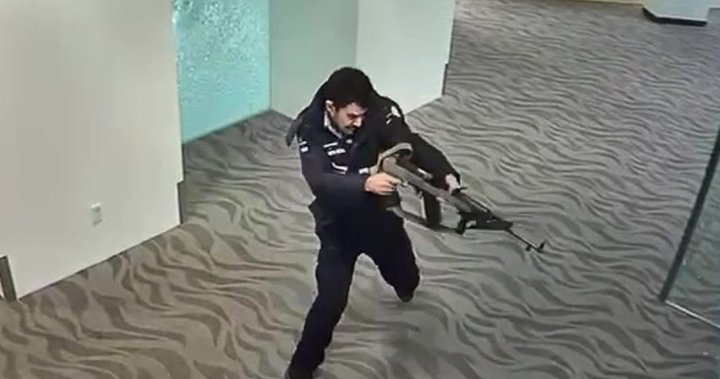A new kind of violence known as “salad bar extremism” has come to Canada, warns an internal government report obtained by Global News.
The term refers to attacks fuelled by a mix of views rather than a coherent ideology, said the report, which cited the recent Edmonton city hall shooting.
“While some extremists are assessed to have a primary motivation, others are influenced by a combination of beliefs,” said the Strategic Threat Assessment.
“This phenomenon is occurring in Canada,” according to the June 4, 2024, report by the government’s Integrated Terrorism Assessment Centre (ITAC).
Also called composite extremism, it is “driven by a myriad of messaging within mainstream social discourse as well as extremist propaganda that is internalized by an individual,” it said.
“Variations of this phenomena have been referred to as composite violent extremism, salad bar extremism, or mixed, unstable, or unclear (MUU) extremism,” the ITAC report said.
The Canadian Security Intelligence Service released a redacted version of the document to Global News under the Access to Information Act.
A screenshot from a video posted to YouTube of Bezhani Sarvar, who is accused in a shooting at Edmonton City Hall on Jan. 23, 2024.
Supplied
The report partly focused on a Jan. 23 attack at Edmonton city hall. Armed with an SKS-style rifle, a gunman fired shots and lobbed incendiary devices inside the building.

Get daily National news
Get the day’s top news, political, economic, and current affairs headlines, delivered to your inbox once a day.
Prior to the incident, he had allegedly recorded a manifesto that touched on everything from water quality to the Gaza “genocide.”
“I’m just tired of seeing the tyranny and corruption taking over our society and our lives … Inshallah [God willing], I will succeed with my mission,” he said.
Bezhani Sarvar, a 28-year-old Edmonton resident, was arrested at the scene and charged with eight offences. The RCMP later charged him with two counts of terrorism.
“In a video posted online before the incident, the accused laid out a broad series of likely grievances,” ITAC wrote in its report on “mixed extremist motivations.”
The statement evoked themes normally associated with ideological and religious violence, and blended them with inflation and housing issues, it said.
“The accused also referenced additional concepts not connected to violent extremism, such as society’s use of phones and the promotion of healthy choices and exercise.”
The report said that it was “highly likely” the attack was an act of domestic extremism and that it was the first incidence of political violence in Canada in a decade.

The Canadian government categorizes terrorism as ideologically motivated, politically motivated, or in the case of groups like the Islamic State, religiously motivated.
But increasingly, extremists do not fit neatly into those boxes and have developed personal worldviews that pick and choose from disparate schools of thought.
“It is a trend that we are seeing,” RCMP Assistant Commissioner Brigitte Gauvin, the head of the national security investigations, told Global News in an interview.
“We are seeing traditional religiously motivated violent extremism, but we also see, on the other hand, a mix of ideologies, which doesn’t make it less concerning,” she said.
“But I would agree, we are seeing more and more of a mixture of ideologies and grievances that motivate people to commit violent acts.”
Police during the shooting investigation at Edmonton City Hall on Jan. 23, 2024.
Global News
On July 2, 2020, a heavily armed former army reservist, Corey Hurren, rammed his truck through the gates of Rideau Hall to “arrest” Prime Minister Justin Trudeau.
A judge later called it a “politically-motivated armed assault,” but Hurren’s motives ranged from anger over gun laws and pandemic restrictions to his financial troubles and conspiracy theories.
Although ITAC said it tried to determine the “primary driving factor” of extremists, violent groups can straddle differing categories of extremism.
The Iranian-backed Palestinian terrorist group that controls Gaza, for example, “blurs the line” between religious and political violence, it said.
Because Hamas wants an “Islamist Palestinian state,” both religious and political extremists “could be inspired by the current conflict,” according to the report.
Stewart.Bell@globalnews.ca
© 2024 Global News, a division of Corus Entertainment Inc.





